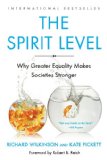Summary | Excerpt | Reviews | Beyond the Book | Readalikes | Genres & Themes | Author Bio
Why More Equal Societies Almost Always Do Better

Critics' Opinion:
Readers' Opinion:
First Published:
Dec 2009, 352 pages
Paperback:
Apr 2011, 352 pages
 Book Reviewed by:
Book Reviewed by:
Jo Perry
Buy This Book
Adapted from the introduction
It seems likely that environmental constraints on economic growth will dominate world politics for the foreseeable future. A pessimistic view would be that this is the beginning of the end of the most prosperous chapter in human history, and that business activity will be submerged – if not by storms and rising sea levels – then by a rising tide of government restrictions. A more optimistic response is to view the necessary constraints on economic growth as an opportunity to create a new and better post-consumerist society.
As the quality of life is so often defined in terms of material living standards and national income per person, it might seem paradoxical to claim that environmental restrictions on economic growth need not involve sacrificing our quality of life. But if instead we define the ‘quality of life’ in terms of life expectancy, happiness and well-being, then the data clearly shows that we, in the rich market democracies, no longer benefit from increasing affluence.
Although economic growth has been the most important driver of human progress in the past and still has a crucial role to play in improving lives in developing countries, we in the developed world must now look elsewhere for further improvements in the real quality of life.
We are social epidemiologists; people who usually spend their time trying to understand how social factors affect population health. Our work has focused on different aspects of wellbeing in rich market democracies. Rather than looking at subjective measures, such as happiness, we have looked at objective measures, such as life expectancy, homicide rates, drug abuse, child well-being, levels of trust, involvement in community life, mental illness, teenage birth rates, children’s math and literacy scores, and the proportion of the population in prison.
Instead of finding that each society does well on some of these outcomes and badly on others, we found that countries tend to be consistently good or bad performers, across the board. If a country has high life expectancy, it also tends to have stronger community life, a smaller proportion of its population behind bars, better mental health, fewer drug problems and children doing better in school.
The differences in the performance of more and less equal countries are very large. Rather than things being just a bit worse in more unequal countries, they are very much worse. More unequal countries have three times the rates of violence, of infant mortality and of mental illness. Their teenage birth rates are six times as high, and rates of imprisonment are eight times higher.
What could account for such huge differences in performance, spread across so many outcomes?
The answer turned out to be surprisingly simple – inequality. The bigger the income differences between the rich and poor in a country, the worse it does. The relationship could not have been clearer: the greater the inequality the more socially dysfunctional societies become – regardless of their overall economic performance. Whether a country is as rich as the USA or, like Greece, only half as wealthy, seems to have no bearing on levels of health and social problems.
The measure of inequality we used was the ratio of the incomes of the top 20 percent compared to the incomes of the bottom 20 percent in each country. In the less unequal countries (such as Japan, Finland, Norway, Sweden) the top 20 percent have 3.4 to 4.0 times as much. In the more unequal countries (USA, Portugal, UK) they have between 7 and 8.5 times as much. By this measure they are twice as unequal as the more equal countries.
In case people thought that our findings – despite very high levels of statistical significance – reflected nothing more than the vagaries of national culture and political history, we decided to use the 50 US states as a separate test bed, and look to see whether more unequal states also perform less well. We found that for the US states, as for countries, the greater the income differences the greater a society’s burden of health and social problems. And again, average incomes were unimportant.
Excerpted from The Spirit Level by Kate Pickett and Richard Wilkinson. Copyright © 2010 by Kate Pickett and Richard Wilkinson. Excerpted by permission of Bloomsbury. All rights reserved. No part of this excerpt may be reproduced or reprinted without permission in writing from the publisher.





The Funeral Cryer by Wenyan Lu
Debut novelist Wenyan Lu brings us this witty yet profound story about one woman's midlife reawakening in contemporary rural China.
Your guide toexceptional books
BookBrowse seeks out and recommends the best in contemporary fiction and nonfiction—books that not only engage and entertain but also deepen our understanding of ourselves and the world around us.